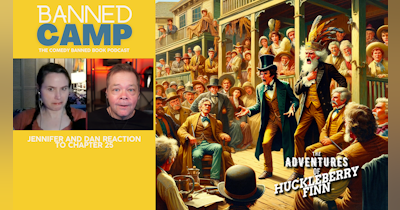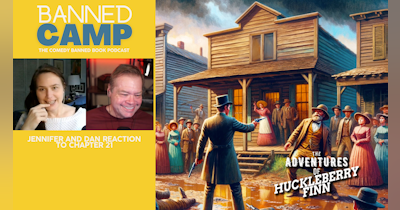Jennifer and Dan discussed Chapter 20 of "The Adventures of Huckleberry Finn" thoroughly in their recent episode on Banned Camp, the podcast that fearlessly explores the world of banned literature with a hefty dose of humor. But now, it's time to roll up our sleeves and dive even deeper into the pages of this controversial chapter.
Welcome, fellow book enthusiasts, to an extended exploration of Chapter 20 of "The Adventures of Huckleberry Finn," where we'll dissect its hidden gems, unravel its themes, and decode the characters' motivations. Banned Camp, known for its audacious take on banned books and its outspoken stance against book banning, brings a unique perspective to literary analysis.
In this article, we won't just retell the story; we'll dig into the nooks and crannies of Mark Twain's masterpiece. We'll explore the character development, themes, and symbols that make this chapter a standout in American literature. And of course, we'll address the burning question: why might this chapter, like many others in "The Adventures of Huckleberry Finn," have faced attempts at censorship?
So, whether you're a literature connoisseur, a casual reader, or just curious about the world of banned books, join us on this intellectual adventure as we embark on an unforgettable journey down the Mississippi River with Huck, Jim, and the enigmatic characters of Chapter 20. Buckle up, folks; it's going to be a wild ride!
What Is In Chapter 20 of "The Adventures of Huckleberry Finn"?
Catch up on all of the Banned Camp episodes about "The Adventures of Huckleberry Finn" here before we dive into the intriguing world of Chapter 20.
In this pivotal chapter, our adventurous duo, Huck and Jim, find themselves in the company of the scheming duke and king, two characters who bring a whole new level of complexity to Twain's narrative. The chapter kicks off with the duke and king hatching their next big scheme, leading them to land their raft near the sleepy town of Pokeville, which is eerily deserted due to a nearby camp meeting.
As the duke heads off to find a printing shop, the king decides to take an unexpected detour to the camp meeting. Here, the story takes a fascinating twist as the king joins the townspeople in singing hymns and seeking forgiveness at the pulpit. What follows is a brilliant performance as he portrays himself as an old pirate turned reformed man, shedding tears and collecting an unexpected windfall in the form of $87 dollars and a jug of whisky.
This chapter is a rollercoaster of emotions and revelations, showcasing Twain's knack for blending humor with social commentary. It's a microcosm of the larger themes at play in "The Adventures of Huckleberry Finn," such as deception, the complexity of human nature, and the blurred lines between right and wrong. Stay with us as we peel back the layers and explore the nuances of this intriguing chapter in the context of the book's overall narrative. And who knows, there might even be a comedic moment from the Banned Camp episode that we can't resist sharing along the way!
Character Development
In Chapter 20 of "The Adventures of Huckleberry Finn," the characters take center stage, and their development takes an intriguing turn. Let's delve into the transformations and complexities that this chapter reveals:
The Duke and The King: Masters of Deception
The chapter opens with the duke and the king deep in scheming mode, which exemplifies their deceptive and opportunistic natures. Their arrival in Pokeville and their plans to exploit the deserted town for their own gain underscore their manipulative tendencies. As they take on new personas, the king's impulsive decision to attend the camp meeting and pose as a reformed pirate adds layers to their characters.
Huck's Observant Nature
Huck, our young protagonist, continues to serve as the astute observer of human nature. His insights into the duke and king's schemes and the townspeople's reactions provide readers with a lens through which to view the unfolding events. Huck's growing ability to navigate the complex world of adults is evident as he grapples with the moral implications of the duke's printed handbill about Jim.
Jim's Resilience
While Jim doesn't play a central role in this particular chapter, his presence is still felt. His loyalty to Huck and his resilience in the face of adversity remain constant. As the duke and king's schemes unfold, Jim's fate becomes increasingly entwined with theirs, setting the stage for future conflicts and moral dilemmas.
Character development in "The Adventures of Huckleberry Finn" is a nuanced journey, and Chapter 20 offers a glimpse into the ever-evolving personalities and motivations of the book's key players. As we dissect the chapter's events and their impact, we'll continue to unravel the intricacies of these characters and their roles in the larger narrative.
Themes and Symbols
Chapter 20 of "The Adventures of Huckleberry Finn" is a treasure trove of themes and symbols that add depth and complexity to Mark Twain's timeless narrative. Let's navigate these literary waters and explore what lies beneath the surface:
Deception and Identity
One of the central themes in this chapter is deception and the fluidity of identity. The duke and the king continuously reinvent themselves to fit their immediate needs, whether it's scheming for money or seeking refuge at the camp meeting. Their ability to adopt new personas highlights the malleability of identity, a theme that runs throughout the entire novel as characters grapple with questions of self-discovery and authenticity.
Morality and Conscience
As the king presents himself as a reformed pirate seeking forgiveness at the camp meeting, the chapter delves into the themes of morality and conscience. The townspeople's willingness to forgive a former pirate and their contributions reveal the complex interplay of societal values and personal beliefs. Huck's internal struggle over Jim's situation also underscores the moral dilemmas he faces on his journey down the river.
The River as a Symbol
The Mississippi River, a constant presence in the novel, continues to serve as a powerful symbol in Chapter 20. It represents freedom, escape, and a world outside the confines of society's norms. The river's flow mirrors the ever-changing circumstances and identities of the characters, highlighting the fluidity of life on the raft.
Irony and Satire
Twain's trademark humor and satire shine through in this chapter, particularly in the king's performance at the camp meeting. The irony of a former pirate preaching redemption and the townspeople's gullibility provide a satirical commentary on human nature and societal conventions.
The Handbill as a Catalyst
The duke's decision to print a handbill describing Jim as a runaway slave introduces a significant symbol in this chapter. The handbill not only complicates the characters' lives but also sets the stage for future conflicts and moral reckonings. It becomes a potent symbol of the racism and discrimination deeply ingrained in society during the time of the novel.
In "The Adventures of Huckleberry Finn," themes and symbols intertwine to create a rich tapestry of storytelling. Chapter 20 offers a glimpse into the complexity of these themes and their enduring relevance. As we continue our exploration, we'll uncover how these elements contribute to the overarching narrative and the book's enduring legacy.
Chapter's Impact on the Overall Story
In the grand tapestry of "The Adventures of Huckleberry Finn," Chapter 20 stands as a pivotal and multifaceted piece that significantly influences the overall narrative. Here's how this chapter's events ripple through the story's fabric:
Shaping the Dynamic Duo
Chapter 20 introduces the duke and king, two characters who will become central to the plot's development. Their cunning schemes, adaptability, and knack for deception set the stage for the many twists and turns to come. Their presence adds layers of complexity to Huck and Jim's journey, transforming the dynamic duo into a quartet, each member bringing their own motivations and moral dilemmas.
Moral Quandaries
The chapter deepens the moral quandaries faced by Huck and Jim. The duke's printing of the handbill identifying Jim as a runaway slave thrusts the characters into an ethical dilemma. Huck, torn between societal expectations and his growing friendship with Jim, finds himself at a crossroads. This internal struggle over right and wrong will continue to shape his character and drive key decisions throughout the novel.
Foreshadowing and Conflict
Chapter 20 serves as a foreshadowing device, hinting at the conflicts and challenges that lie ahead. The introduction of the handbill sets the stage for future confrontations, as Huck and Jim's freedom on the raft becomes increasingly precarious. The choices made in this chapter will reverberate in subsequent events, raising the stakes and intensifying the story's dramatic tension.
Satirical Commentary
Mark Twain's satirical commentary on human nature and societal conventions is in full swing in this chapter. The king's performance at the camp meeting is a prime example of Twain's wit and irony. Through this satirical lens, Twain invites readers to reflect on the absurdities of the world he portrays and the gullibility of those who inhabit it.
In essence, Chapter 20 of "The Adventures of Huckleberry Finn" is a narrative cornerstone that not only introduces new characters and moral complexities but also foreshadows the challenges that Huck and Jim will face on their journey down the Mississippi. Its impact on the overall story is profound, setting the stage for the unfolding drama and the exploration of timeless themes that continue to resonate with readers today.
Banning Triggers: Themes from this Chapter
As we delve deeper into Chapter 20 of "The Adventures of Huckleberry Finn," it's essential to address the potential banning triggers that might have caused this classic novel to be targeted by censorship advocates. Jennifer and Dan, in their fearless exploration of banned literature on Banned Camp, recognize some of these themes, but they find no reason in this chapter to ban the book based on them.
Racism and Slavery
One of the most prominent themes in the novel is the issue of racism and the institution of slavery. In this chapter, the duke's decision to print a handbill identifying Jim as a runaway slave brings this theme to the forefront. Twain's unflinching portrayal of the racial prejudices of the time can be uncomfortable, but it is a vital aspect of the book's critique of society.
Deception and Morality
Deception is a central theme in Chapter 20, with the duke and king constantly reinventing themselves for personal gain. This theme can be seen as a commentary on the moral ambiguity of human actions. The characters' willingness to deceive and manipulate others raises questions about the boundaries of morality.
Gullibility and Social Commentary
Twain uses satire to critique the gullibility of the townspeople who readily accept the king's redemption narrative at the camp meeting. This theme highlights the absurdities of societal conventions and the power of persuasive storytelling.
Identity and Authenticity
The fluidity of identity, as demonstrated by the duke and king, plays a significant role in this chapter. It prompts readers to ponder questions about authenticity and the masks people wear to navigate societal expectations.
While these themes may be uncomfortable or challenging, Jennifer and Dan, in their comedic yet insightful analysis, recognize that the book's intention is not to promote these themes but to expose and critique them. They find no reason in Chapter 20 to ban "The Adventures of Huckleberry Finn" and instead advocate for engaging with the text to confront the complexities of history and human nature.
Conclusion
In the intricate tapestry of "The Adventures of Huckleberry Finn," Chapter 20 emerges as a chapter rich in character development, themes, and symbolism. The introduction of the duke and king adds layers of complexity to the story, setting the stage for moral dilemmas, ethical quandaries, and moments of satirical brilliance.
While this chapter explores challenging themes such as racism, deception, and the fluidity of identity, it does so with a purpose – to provoke thought and reflection on the societal norms of the time. Jennifer and Dan, the fearless hosts of Banned Camp, recognize these themes but find no grounds in this chapter to support the banning of this literary classic.
Banned Camp, a comedy podcast where we read banned books and find out why they were banned in the first place. Dive into our banned book podcast to explore more. Join us in our mission to uncover the truths, challenge the norms, and celebrate the power of literature. In our next adventure, we'll continue to navigate the murky waters of banned books, armed with humor, insight, and a passion for preserving the freedom to read. Stay tuned for more literary escapades!
Further Reading
Explore these additional resources to deepen your understanding of "The Adventures of Huckleberry Finn" and its broader themes:
-
"The Adventures of Huckleberry Finn" - Full Text Access the complete text of Mark Twain's masterpiece online to read or revisit the entire novel at your own pace. http://www.gutenberg.org/ebooks/76
-
"Huck Finn and the Censorship Debate" - Article Delve into the ongoing censorship debates surrounding "The Adventures of Huckleberry Finn" and gain insights into the book's contested history. https://www.pbs.org/wgbh/cultureshock/teachers/huck/essay.html
-
"Mark Twain's Huckleberry Finn: Text, Illustrations, and Early Reviews" - Digital Collection Explore a digital collection featuring the original illustrations, early reviews, and various editions of the novel to gain a comprehensive view of its historical context. https://www.loc.gov/collections/mark-twains-huckleberry-finn
These resources offer a wealth of information and perspectives on "The Adventures of Huckleberry Finn," its enduring significance, and the complex issues it addresses. Dive in and continue your exploration of this literary classic.











